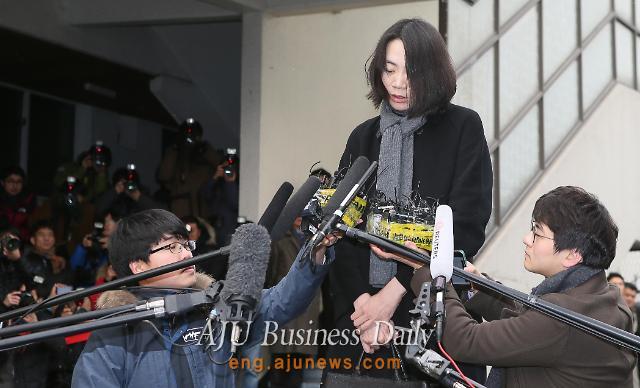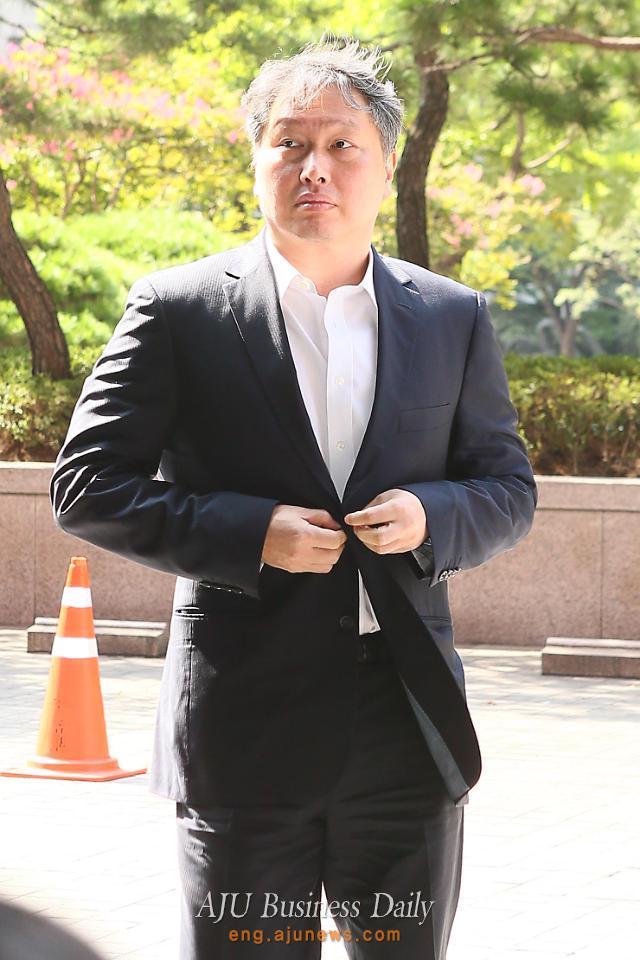
Korean Air vice president Cho Hyun-ah answers medias' questions during a press call after her first court hearing [Photo by Yoo Dae-gil = dbeorlf123@]
(Eds note: This is the first general view in a series of articles looking into key issues of South Korean conglomerates. Aju News will endeavor to respond to the needs of readers by delivering in-depth analysis of major companies and industries.)
A spoilt young heir to one of South Korea's powerful conglomerates ruthlessly beats his friend and secretary with a bamboo sword after being seized with uncontrollable rage.
It's not real but a fictional scene from South Korea's TV hit drama "Remember - War of the Son," an intense thriller with dark and psychotic themes, starring actors Yoo Seung-ho and Namgoong Min.
In the drama, which was over in late February, Yoo acted as a lawyer with the condition of hyperthymia, struggling to prove the innocence of his imprisoned father who lost his memory due to Alzheimer's disease and was wrongfully convicted of murder in a trap set by Namgoong's family.
Namgoong played a third-generation offspring of the conglomerate's ruling family who indulges in all sorts of vices as an imperious degenerate and has an anger management problem.
Remember was the latest in a series of movies and TV dramas which have highlighted bad behaviors by offsprings of the tycoons who founded South Korea's giant family-controlled conglomerates known as chaebol.
Business groups were once described as the engine of prosperity and credited for powering South Korea's post-war economic miracle, despite their autocratic leadership and dynastic succession practices. But they are now often compared to voracious dinosaurs which are ubiquitous in South Korea's daily lives.
North Korea's blatant dynastic succession has been an international make-game, but experts say chaebol bosses have avoided criticism by using a complicated web of cross-shareholdings to control their empires with small stakes and minimum investor interference.
-- NUT RAGE INCIDENT --
For decades, there has been criticism on and off of chaebol's poor corporate governance, tax evasion and other illegal business practices.
Public anger, however, surged after a "nut rage" incident involving Korean Air vice president Cho Hyun-ah in December 2014 that followed a slew of incidents involving group owners and their offsprings.
Cho became enraged when a flight attendant served her some nuts in a bag, rather than on a plate, on board a flight that was forced back to the gate while taxiing to the runway.
She was arrested and given a twelve-month prison sentence on conviction of violating aviation safety laws, but an appeals court overturned the conviction, allowing her to walk free in May last year after serving five months in jail.
She was among the children in the running to replace her father and Korean Air boss Cho Yang-ho, who also heads the Hanjin Group. But she fell off the ladder as the incident hurt Korean Air's reputation, forcing her father to apologize and suggest he should share some of the blame for not bringing her up correctly.
Related or not, Cho Hyun-ah's brother and Korean Air executive vice president Cho Won-tae once received a low grade in management ability in an assessment by academics and experts.
Many South Koreans saw her behavior as emblematic of a generation of spoilt and arrogant offspring of chaebol owners.
"This is a direct example showing business dictatorship, which is rampant at chaebol companies," economist Lee Phil-sang said, adding the nut-rage incident was not an isolated case but underlined the ills of chaebol's hereditary succession.
Lee said some first generation patriarchs were respected for contributing to South Korea's economic rise from the ashes of the 1950-53 Korean war, although many had run their companies with almost no corporate ethics and philosophy.
But most of their children view a quick promotion in their groups as a birthright, Lee said, adding the hereditary succession is to blame for a twisted corporate culture of studying the face of bosses.
"They act like crown princes and their privileged sense is so strong that some young heirs to the throne treat top executives like servants," the economist said, likening chaebol's hereditary succession to North Korea's dynastic succession of power.
Professor Kim Sang-jo of Seoul’s Hansung University said in his study that many chaebol owners have nurtured their children unfairly and used illegal methods such as tax evasion for the transfer of ownership.
-- PROMINENT CASES INVOLVING CHAEBOL OWNERS --

SK group chief Chey Tae-won[Photo by Yoo Dae-gil = dbeorlf123@]
Misconduct by South Korea's rich elites has often made headlines. Some have received heavy jail terms, only for them to be pardoned or released on parole on grounds that they were deemed too important to the country's economy to be kept behind bars.
President Park Geun-Hye was elected in late 2012, promising to depart from South Korea's long practice of pardoning convicted chaebol bosses.
In August last year, however, she pardoned SK group chief Chey Tae-won, releasing him from prison after he served 31 months out of his 48-month jail term on charges of funneling group funds into his own personal investment portfolio.
In 1998, Chey inherited the leadership of SK Group, the country's third-largest conglomerate which owns the world's second-largest microchip maker and top mobile operator SK Telecom.
In 2003, Chey received a three-year jail term for his role in an accounting fraud, but he was released after serving seven months. He was embroiled in a scandal again in December last year, confessing that he has a daughter out of wedlock and hopes to divorce his wife Roh Soh-yeong, the daughter of former president Roh Tae-woo.
The scandal, however, was overwhelmed by a bigger and more sensational case involving Kim Man-sik, the 76-year-old founder of Monggo Foods, a major producer of soy sauce.
Kim's driver claimed in a media interview that he was fired after being habitually abused verbally and physically by his boss. Many took it as a typical example of bad behaviors by group owners.
Hanwha Group chairman Kim Seung-youn is also well-known for a series of misconduct. He took over the group specializing in insurance, construction, chemicals, and explosives when he was at the age of 29 after his father died.
His first brush with the law came in 1993 when he was arrested for smuggling cash to Los Angeles to buy a mansion. In 2007, he was convicted of abducting and clobbering Karaoke bar workers, watched by bodyguards to exact revenge for his son who was beaten up at the bar.
In 2012, Kim received a four-year jail sentence after judges accused him of showing no remorse for embezzling company funds for himself and his family. He has trained his eldest son and third-generation family member, Kim Dong-kwan, as heir to the throne.
Some other conglomerates have been beset by succession woes as shown in a fight between the two sons of Shin Kyuk-ho who founded the retail and hotel giant Lotte Group as an ethnic Korean living in Japan.
The battle began in late 2014 when Dong-joo, the founder's elder son who ran groups operations in Japan, was removed from his post, while Shin's younger son, Dong-bin, who runs South Korean operations, seized control of Lotte Holdings, the group's Tokyo-based holding company, in a bid to succeed his father.
In July last year, the ailing father fired his younger son. Since then, the two sons have continued to challenge each other's claims to the empire.
-- GENERATIONAL CHANGE --
Of South Korea's 30 leading conglomerates, Doosan specializing in consumer goods, manufacturing, trading and construction, became the first to complete a fourth-generation succession in early March by designating Park Jeong-won, chairman of the group's de facto holding firm Doosan Corp, as the group's new boss.
But other conglomerates are still undergoing a generational change.
Many children now in their 30s and 40s have been groomed for chaebol's leadership succession, studying abroad and working at consulting firms, said Park Jun-gun who heads chaebol analysis provider CEO Score.
The children enter the empires at an average age of 28 and are promoted to the executive level in an average of 3.5 years. Their academic background overseas sometimes plays a positive role, but there are concerns generally over the abilities of young executives, Park said.
"Hereditary succession is basically non-sense as it provides almost no room for checking arbitrary judgment," he said, adding the third and fourth-generation family members are mostly inexperienced because they do not go up the promotion ladder in a proper and gradual manner.
"The conglomerates have employed this kind of backward corporate governance, promoting inexperienced young family members to top decision-making posts just for the transfer of wealth and ownership in an act that runs against the interests of shareholders," Park said.
Shinsegae Group, one of the country’s biggest retailers, was listed as a good case for transferring group leadership fairly only in legal terms, he said.
The group has placed Chung Yoo-kyung, the daughter of group chairwoman Lee Mung-hee, on the top of its department store business. She joined the family business in 1996 and is now taking on more responsibility next to her brother and vice chairman Chung Yong-jin.
Of all, Park described Hyundai Motor vice chairman Chung Eui-sun, the only son of Hyundai Motor Group chairman Chung Mong-koo, as the "most promising" next leader who can properly manage the country's second largest conglomerate after his father retired.
Eui-Sun has grown in experience and wisdom while serving as president of Hyundai Motor's sister firm, Kia Motors, from 2005 to 2008. The 45-year-old has gradually raised his stake in group affiliates for a smooth succession.
Aju News Lim Chang-won = cwlim34@ajunews.com

